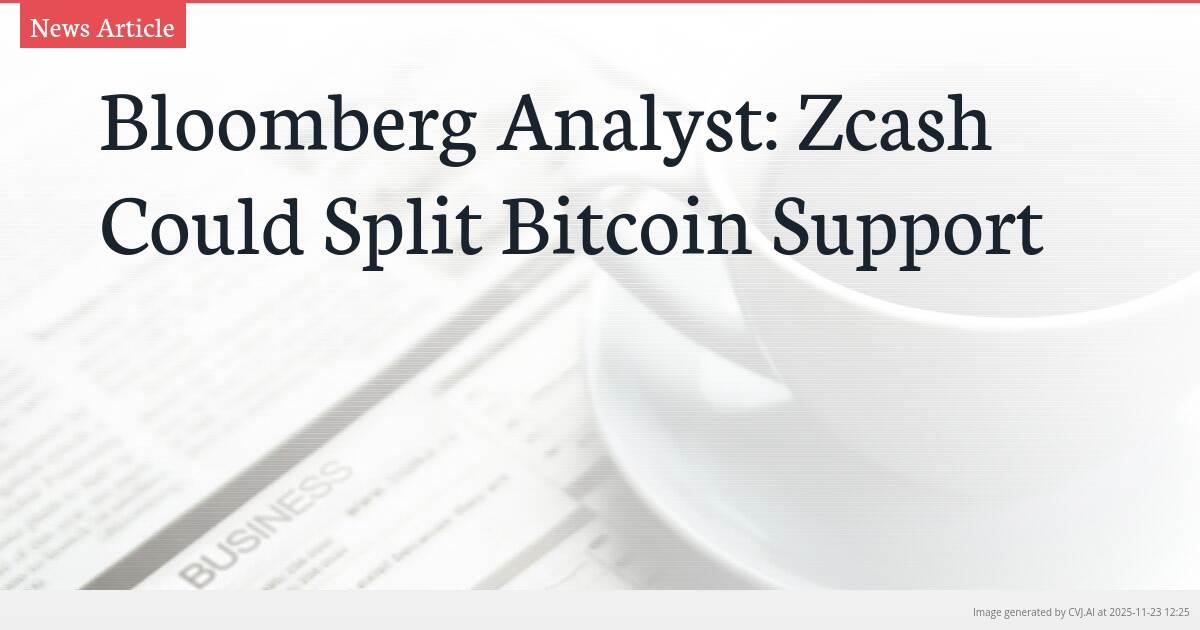Introduction
Bloomberg’s senior ETF analyst Eric Balchunas has raised concerns that Zcash could fragment political and cultural support for Bitcoin at a critical juncture. He compares the privacy coin to third-party political candidates that risk splitting the vote when unity is most needed. The comments come amid growing debate between Bitcoin and Zcash proponents.
Key Points
- Eric Balchunas compares Zcash to third-party political candidates that could split Bitcoin's support base
- Timestamp CEO Arman Meguerian disputes the notion that Bitcoin maximalists are pivoting to Zcash
- The debate highlights concerns about cryptocurrency fragmentation during Bitcoin's critical adoption phase
The Third-Party Candidate Analogy
Bloomberg Senior ETF Analyst Eric Balchunas has issued a stark warning about Zcash’s potential impact on Bitcoin’s political standing, drawing a compelling parallel to third-party political candidates. In a recent social media post, Balchunas explicitly compared Zcash to figures like Gary Johnson or Jill Stein, suggesting the privacy-focused cryptocurrency carries what he described as ‘third-party candidate vibes.’ This analogy underscores his concern that Zcash could fragment the unified political and cultural support Bitcoin desperately needs during what he characterizes as a crucial moment for the original cryptocurrency.
The core of Balchunas’s argument centers on the concept of ‘splitting the vote.’ Just as third-party candidates can dilute support for major political contenders, Balchunas contends that pushing a separate privacy coin like Zcash risks dividing the cryptocurrency community’s advocacy efforts and resources. This fragmentation concern emerges as Bitcoin continues to navigate complex regulatory landscapes and seek broader institutional adoption in markets like the United States, where unified political backing could prove decisive.
The Bitcoin Community's Response
The cryptocurrency community has responded with mixed reactions to Balchunas’s warnings. Arman Meguerian, founder and CEO of Timestamp, directly challenged the Bloomberg analyst’s premise in his own social media post. Meguerian dismissed the notion that Bitcoin supporters are pivoting to Zcash, stating unequivocally: ‘I don’t know a single Bitcoin maxi that thinks about Zcash at all.’ This counterpoint suggests that within the core Bitcoin maximalist community—those who believe Bitcoin will remain the dominant cryptocurrency—Zcash may not represent the significant threat that Balchunas envisions.
The exchange between Balchunas and Meguerian highlights a fundamental tension within cryptocurrency discourse about how alternative coins impact Bitcoin’s position. While Balchunas sees potential for dilution of support, Meguerian’s perspective suggests Bitcoin maximalists maintain their focus exclusively on Bitcoin’s development and adoption, largely ignoring competing projects like Zcash. This divergence of views reflects broader debates about whether the proliferation of alternative cryptocurrencies strengthens the overall digital asset ecosystem or weakens Bitcoin’s claim as ‘digital gold.’
Broader Implications for Crypto Politics
Balchunas’s warning arrives during what he describes as a ‘crucial moment’ for Bitcoin, likely referencing ongoing regulatory developments, institutional adoption trends, and the evolving political landscape surrounding digital assets in the United States. His position as a senior ETF analyst at Bloomberg lends particular weight to his concerns, given the significant role that regulatory approval of Bitcoin ETFs has played in mainstream financial adoption. The comparison to political candidates suggests he views cryptocurrency adoption as not just a technological or financial battle, but a political one requiring coordinated advocacy.
The intensifying Bitcoin versus Zcash debate that Balchunas references touches on deeper questions about cryptocurrency specialization versus consolidation. While Bitcoin has established itself as a store of value and medium of exchange, privacy-focused coins like Zcash offer specific technological features that appeal to different user priorities. However, Balchunas’s analysis suggests that in the political arena, this specialization could come at the cost of diluted messaging and fragmented lobbying efforts when facing regulatory bodies and political institutions.
Ultimately, the disagreement between financial analysts like Balchunas and industry participants like Meguerian reveals ongoing uncertainty about how the cryptocurrency ecosystem will evolve politically. As regulatory frameworks continue to develop in the United States and other major markets, the question of whether a diverse cryptocurrency landscape strengthens or weakens the case for digital assets remains unresolved, with significant implications for investors, developers, and advocates across the crypto space.
📎 Source reference: cointelegraph.com

